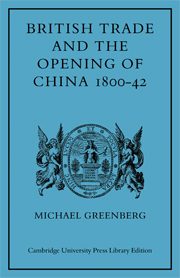Book contents
- Frontmatter
- Contents
- Money, Weights and Abbreviations
- Author's Preface
- CHAPTER I THE OLD CHINA TRADE
- CHAPTER II THE HONOURABLE COMPANY AND THE PRIVATE ENGLISH
- CHAPTER III THE CANTON COMMERCIAL SYSTEM
- CHAPTER IV THE DEVELOPMENT OF THE CANTON TRADE TO 1834
- CHAPTER V OPIUM
- CHAPTER VI BUSINESS AND FINANCIAL ORGANISATION
- CHAPTER VII THE VICTORY OF THE FREE TRADERS
- CHAPTER VIII LEDGER AND SWORD
- APPENDICES
- Bibliography
- Index
CHAPTER IV - THE DEVELOPMENT OF THE CANTON TRADE TO 1834
Published online by Cambridge University Press: 07 October 2011
- Frontmatter
- Contents
- Money, Weights and Abbreviations
- Author's Preface
- CHAPTER I THE OLD CHINA TRADE
- CHAPTER II THE HONOURABLE COMPANY AND THE PRIVATE ENGLISH
- CHAPTER III THE CANTON COMMERCIAL SYSTEM
- CHAPTER IV THE DEVELOPMENT OF THE CANTON TRADE TO 1834
- CHAPTER V OPIUM
- CHAPTER VI BUSINESS AND FINANCIAL ORGANISATION
- CHAPTER VII THE VICTORY OF THE FREE TRADERS
- CHAPTER VIII LEDGER AND SWORD
- APPENDICES
- Bibliography
- Index
Summary
Hitherto we have been considering the framework of the China trade, the general conditions within which the British merchants at Canton operated. We must now turn to the trade itself and examine its constituents and its lines of development. It is intended to analyse trends rather than describe ‘typical’ voyages or cargoes. Descriptive accounts of ports and ships, lists of articles of export and import, often with interesting details of the more exotic commodities in the Eastern trade, are given in such contemporary compilations as Milburn's Oriental Commerce, J. R. Morrison's Commercial Guide to Canton of 1834 and similar handbooks. The inadequacy of the merely descriptive is insisted upon by James Matheson himself, who in his third season at Canton wrote to a Singapore friend that ‘the most minutely written description could scarcely suffice to give you anything like an accurate idea of a market singular and different in many respects from all others’. Not to give a general survey of the movements of import and export figures at Canton, but rather to look into the actual operations revealed in the surviving books of the firms concerned is the purpose of this chapter. The subject of opium, on account of its special importance, will be treated separately in the following chapter. Separate treatment will likewise be given to the organisation and financing of the trade and its ancillaries, such as shipping and insurance.
In the period prior to 1834, when the advent of free trade into the China commerce modified its character, there can be separated two broad phases.
- Type
- Chapter
- Information
- British Trade and the Opening of China 1800–42 , pp. 75 - 103Publisher: Cambridge University PressPrint publication year: 1970



